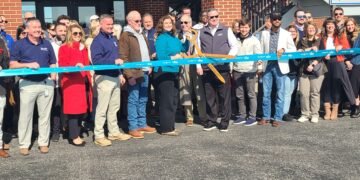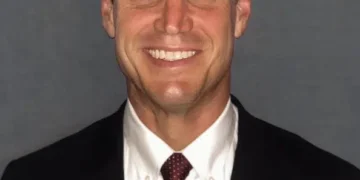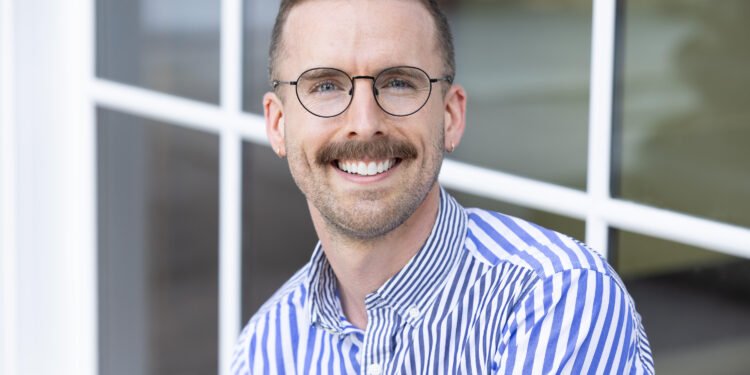Henderson native Aaron Edwards has been named by Harvard Business School as one of its five 2024-2025 Blavatnik Fellows, providing him with resources to advance the startup biomedical technology company he co-founded and hone his leadership talents over the coming 12 months.
Edwards in May completed his MBA from Harvard Business in biotechnology plus a master’s in biotechnology and life sciences.
He has co-founded and is CEO of KiraGen Bio, which seeks to use artificial intelligence and gene-editing technology to break through the formidable defenses of solid tumors and, hopefully, save lives.
The son of John and Christi Edwards of Henderson, he is a 2008 graduate of Henderson County High School (while also participating in the inaugural class of the prestigious Gatton Academy of Mathematics and Science at Western Kentucky University). Edwards sent a shout out to “the teachers I had throughout the years in Henderson that helped spark my passion for science and inspired me to reach for the stars.”
He earned his undergraduate degree in biology from Centre College in Danville and a master’s in medical sciences (immunology/virology) from Boston University School of Medicine before earning his master’s and MBA from Harvard.
He has also gained extensive experience in the biomedical technology industry, including notable roles at Novartis Vaccines, bluebird bio and Beam Therapeutics, where he led in vitro biology for their clinical CAR-T program for T-cell leukemias.
“The technological revolution is definitely here for biotech and life sciences,” Edwards said in a telephone interview from Boston, where he has lived for the past dozen years. “Recently, in the last 10 years, we have gained the ability to, say, have a leukemia patient, take their cells out—like a blood draw—and do some clever engineering in the lab, particularly with T-cells, to target a tumor intentionally. This is now commercialized for leukemia. Back then, it was definitely not as encouraging a diagnosis to get. Some of these patients are now fully cured.”
Edwards intends for his company to pursue AI-driven gene editing to attack solid tumors. Tumor cells floating through one’s body can be fairly readily targeted with treatment, he said.
“But with solid tumors”—which he said account for 90% of cancer patients worldwide—“it’s a very thick mass of cells that has found a way to evade anything you throw at it. They kind of spit things out. Defensively and offensively, it makes it harder to treat. Our company, using next-generation gene-editing technology, can hopefully make our product that we are creating able to resist that type of defense and offense.”
The Blavatnik Fellowship will help address some of the challenges to becoming a biotechnology entrepreneur, he said.
“It’s hard enough, no matter what, to be an entrepreneur,” Edwards said. “There are challenges aplenty. For biotech, it’s not just making an app; there’s a lot of science to be done. Science requires a lot of space and equipment and huge infrastructure and clinical trials. It’s very expensive.”
The fellowship will pay his salary for the next year, “which is a huge, huge win,” he said, and provide some funding for company operations.
But, he added, “The most significant part is mentorship and the cohort of fellows—Harvard MBAs or post-docs—just having them side-by-side creates a community that is invaluable. Knowing four other people (who are) going through something similar in their journey, you can’t measure its value,” plus gaining access to leading biotech industry and biomedical authorities.
Through the Blavatnik Fellowship, Edwards will be joining a community of biomedical entrepreneurs “who have created 45 companies and raised over $520 million in funding to impact the business of science,” according to a Harvard Business School news release.
“It’s impossible to state how valuable that is,” he said.
Edwards intends to spend his year as a fellow advancing KiraGen’s lead initiatives against non-small cell lung cancer and glioblastoma, “a very severe brain cancer.”
Looking ahead, he said that “over the next five years, I would love to see the first results coming out of the first clinical trials.”
While he certainly hopes that KiraGen Bio will become a viable company, “the goal is always to have patients in mind.
“We’re pretty focused on glioblastoma at first,” Edwards said. “It’s inevitably been a death sentence until very recently. It’s extra special to us that we think we have a way to extend people’s lives.”




















